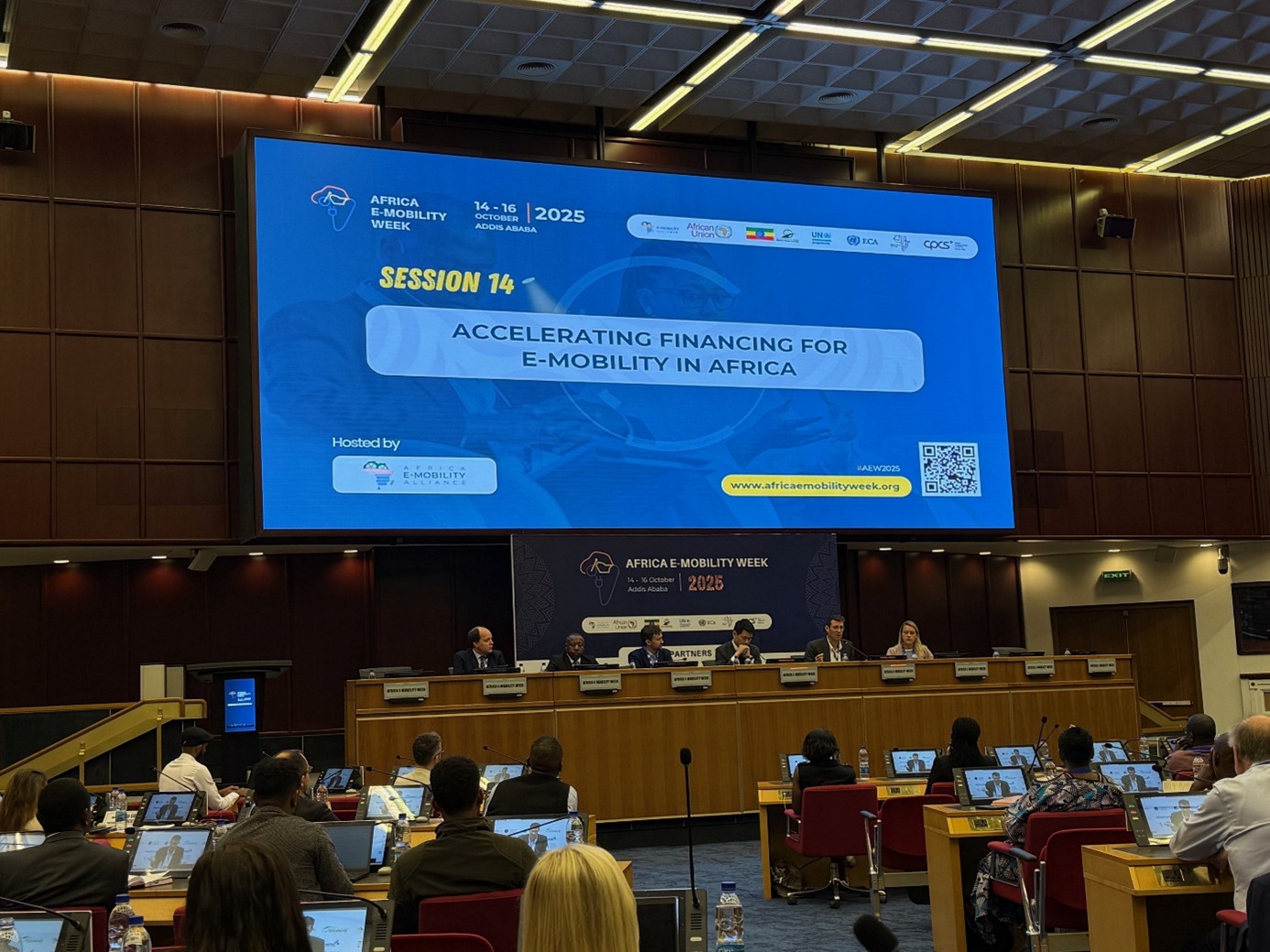Africa’s transport sector is changing fast – and e-mobility is at the heart of this transformation. Across the continent, electric mobility is already creating new economic opportunities, building local value chains, and contributing to global climate goals.
And some countries are emerging as true pioneers.
Ethiopia became the first country in the world in 2024 to introduce a comprehensive ban on the import of petrol and diesel vehicles. In 2025, this ban was extended to heavy-duty vehicles, underlining the country’s ambition about a cleaner transport future.
So, it felt only fitting to host this year’s regional conference Africa E-Mobility Week (AEW) in Addis Abeba, with more than 350 participants from across the continent joining.
This ambition was clearly visible during Africa E-Mobility Week 2025. High-level political engagement throughout the week sent a powerful message: commitment must be followed by action. During the conference, the government presented Ethiopia’s roadmap to e-mobility, outlining ambitious targets for the next five years. More progress is on the way – and it is coming quickly.
The case for e-mobility in Africa is clear
The proof of concept is done. The economics are already competitive and it is about scaling – and startups are the driving force of this transformation across the continent.
According to the latest report from the Africa E-Mobility Alliance (which is available here):
- E-mobility in Africa is accelerating quickly. With more than 30,000 active EVs as of May 2025, the continent is benefiting from global shifts such as upcoming ICE bans in major markets.
- There are over 200 e-mobility companies in Africa, and East Africa remains the growth engine.
- Commercial applications are driving adoption, led by E2W for now.
- African policymakers have turned their attention to e-mobility: 13 countries have published national strategies, and some policies are the first of their kind in the world. But Consistency and implementation remain key issues.
- Investment is rising but still insufficient.
- Gender inclusion and circularity are emerging priorities.
TUMI x Movin’On Involvement at AEW2025
Together, TUMI and Movin’On designed a session to highlight not only the impressive growth of Africa’s e-mobility start-up scene, but also the people and ideas driving it. The session opened with an overview of Africa’s innovation landscape, followed by a deep dive into the opportunities and barriers that start-ups are facing across the continent.
Our discussion brought together founders who are shaping the future of mobility in their cities and regions (click on the company name to learn more about their work!):
- Mbay Mobility (Senegal), enabling taxi and light-transport drivers to access affordable electric cars through smart financing models—boosting incomes while cutting emissions.
- Africharger (Côte d’Ivoire), expanding solar-powered charging infrastructure and battery management systems to close the gap between clean energy and sustainable transport.
- HawKar (Tunisia), developing inclusive electric mobility solutions designed for and with people with reduced mobility
- Mobility for Africa (Zimbabwe), providing solar-powered electric tricycles that strengthen livelihoods in rural and underserved communities, especially for women and smallholder farmers.

Speakers and organizers: Rumbidzai Chingosho (Mobility for Africa), Salim Djide-Yal (Africharger), Charlene Kouassi (Movin’On), Khadija Jallouli (HawKar), Lena Katharina Plikat (GIZ), and Matthew Sellar (Mbay Mobility)
The panel explored what motivates founders daily, the political and financial environments they operate in, and the recurring challenges they face – from access to capital to regulatory uncertainty.
At the same time, each start-up shared the remarkable opportunities they see emerging: rapidly growing demand, supportive policy shifts, and a strong appetite for local innovation.

Stakeholder mapping of Africa’s growing e-mobility start-up ecosystem (Movin’On)
Financing: Still the Missing Piece

© TUMI
One theme returned again and again throughout the week: financing remains one of the biggest barriers to scaling e-mobility in Africa. High capital costs, long investment timelines and a fragmented funding landscape make growth difficult – especially for women founders, who continue to face additional barriers when accessing capital.
WomenMobilizeWomen x UNEP Networking Session

Through WomenMobilizeWomen, we were excited to co-host a dedicated gender networking session together with UNEP. The session brought together inspiring women from policy, entrepreneurship, finance and civil society to share their experiences in e-mobility, exchange ideas and build new connections.
And the discussions made it clear: gender inclusion is a prerequisite for a just and equitable mobility transition. Participants spoke candidly about the barriers they face – from limited access to capital and networks to persistent social norms – and about the enormous potential that emerges when women receive the right support at the right time in their journey.
A Shared Ambition
What stood out during AEW2025 was the openness to learn from one another – and the shared ambition to move the transition of the transport sector forward together. Africa E-Mobility Week 2025 highlighted that the continent’s mobility transition is already underway, powered by bold ideas and dynamic developments.